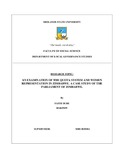Please use this identifier to cite or link to this item:
https://cris.library.msu.ac.zw//handle/11408/3501| Title: | An examination of the quota system and women representation in Zimbabwe: a case study of the Parliament of Zimbabwe | Authors: | Dube, Faith | Keywords: | Quota system Women representation Zimbabwe |
Issue Date: | 2018 | Publisher: | Midlands State University | Abstract: | The main aim of the study was to examine the quota system and women representation in Zimbabwe with a focus on the Parliament of Zimbabwe. A critical assessment of the societal, cultural and economic factors affecting representation and participation of women in politics. It aimed at understanding the policy and legal frameworks which Zimbabwe is a signatory that advocates for women’s representation and participation, examining how quota system overshadows democracy, examining if quota system promotes gender equality, examining the role culture and level of education play in women’s representation in Parliament and to identify challenges resulting in low representation of women in the Parliament of Zimbabwe and recommend possible solutions. Literature review highlighted the definitions from scholarly views the conceptual framework highlighted the various legal framework which Zimbabwe is a signatory which advocates for women’s participation and representation such as the BPFA, CEDAW, MDG, SDG, universal declaration of human rights and international covenant on all civil political rights. The Zimbabwean government enshrined the provisions of those legal frameworks in the constitution for reserved seats for female members. Also examined how quota system overshadows democracy from different scholarly views argues that political representation and participation is a question of representation situation of interests and ideas and not about gender equality by examining the fast track model and the incremental model or the representation of social groups, however some argued that quotas for women do not discriminate rather they compensate for existing barriers that hinder women from reaching their fair share of political seats and they prevent further barriers and mechanisms of exclusions, the conceptual framework also looked at various economic, cultural beliefs and societal factors leading to low representation of women in politics. The study was guided by the critical mass theory and other supporting theories such as the politics of the presence, contagion theory, WAD, WID and GAD. The empirical framework looked at Rwanda were there was provision in the constitution which was pushed for by women after the genocide, Uganda were women in quota seats are there for symbolism as the president was quoted saying that gender quotas are a symbolic gesture for women hence international contagion of gender quotas, Sweden were it took them almost 70 years to reach the target of 30% of quota system and Belgium were quota system was a fast track model for women into politics. The Parliament of Zimbabwe gaps absence of quota regulations, protection of female Parliamentarians in quota seats against discrimination, gender monitoring tools and capacity building programs for female parliamentarians have been identified. Integration use of qualitative and quantitative data was used. The targeted population was MPs, political analyst, and political party members hence the population was infinite, however the research took a sample frame of 22 respondents from various group. Sampling techniques used included stratified random sampling, purposive sampling, quota sampling and convenience sampling. Research instrument are interviews, questionnaires and archival collection so as to counter the weakness of each other. 20 respondents were able to respond and the collected data was analyzed, interpreted and presented using tables, graphs and descriptive narrations. Findings included the challenges to women’s low participation which are cultural, societal and economic, shows quota system overshadows democracy, and also quota system does not promote gender equality but gender representation, challenges such as look down upon each other syndrome, patriarchal dominance, financial constraints and among others were identified. Recommendations included inducing an effective quota system for political parties, use of gender monitoring tools, and also provision that women for quota seats can be independent candidates and implanting zebra system. | URI: | http://hdl.handle.net/11408/3501 |
| Appears in Collections: | Bsc Local Governance Studies Honours Degree |
Files in This Item:
| File | Description | Size | Format | |
|---|---|---|---|---|
| first draft faith FINAL.pdf | Full Text | 2.33 MB | Adobe PDF |  View/Open |
Page view(s)
526
checked on Feb 14, 2026
Download(s)
704
checked on Feb 14, 2026
Google ScholarTM
Check
Items in MSUIR are protected by copyright, with all rights reserved, unless otherwise indicated.



